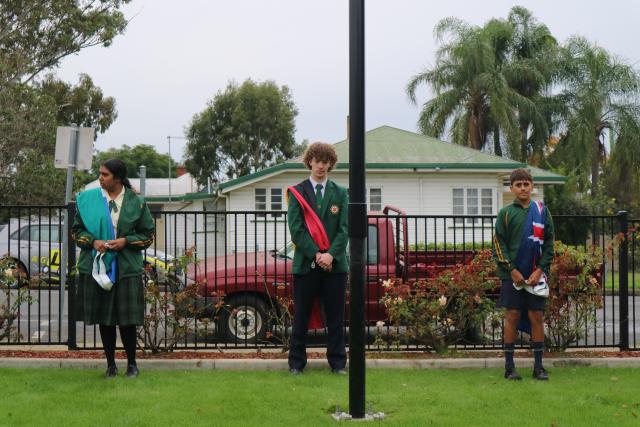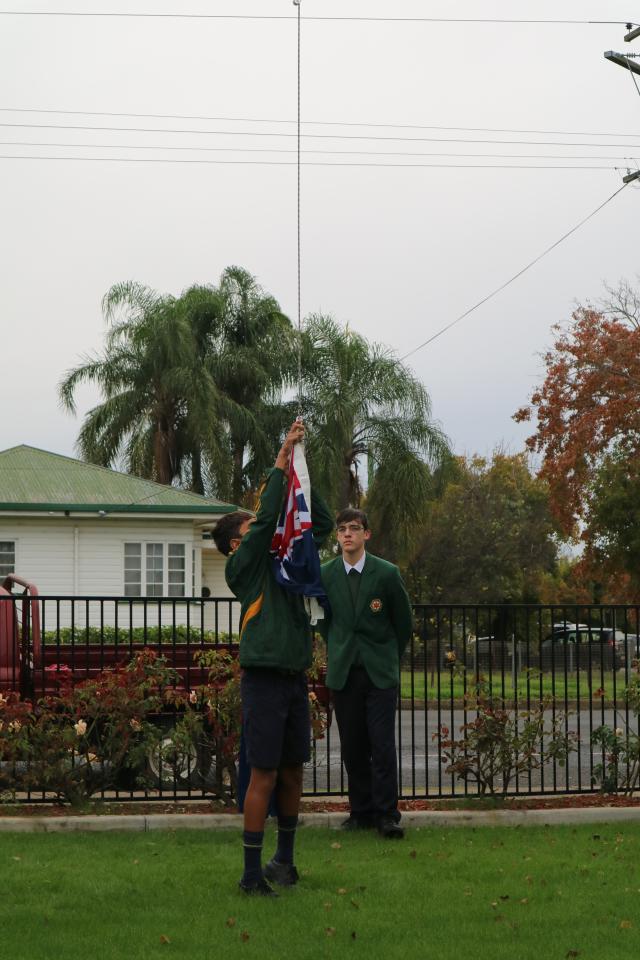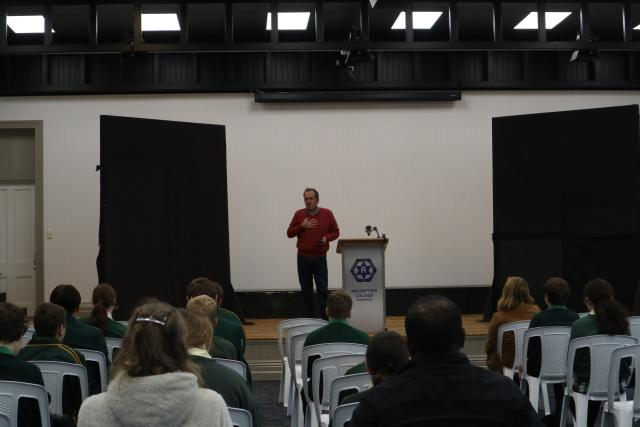
By Dominique Tassell
Assumption College and St Mary’s held a joint reconciliation ceremony on 30 May, with many valuable speakers taking the stage.
Kyanne Kearns gave the Welcome to Country before the flags were raised.
Githabul Elder, Sam Bonner, then gave an impassioned speech about the relationship between Aboriginal Australians and their country, and the need for Aboriginal Australians to be recognised in the constitution.
“You’ve got no shame or respect,” he said. “You don’t treat us like you should.”
“We should be recognised in this country but we’re not, we’re not recognised as anything.”
Sam stated that Aboriginal Australians recognised rules for the environment, and white Australians have broken them all. He said this is why our environment is now having trouble.
He emphasised the importance of Australian youth learning these rules and applying them in future.
He said the prevalence of non-native plants, and not respecting the seasons, is wreaking havoc on the environment.
He spoke of being at his grandfather’s house when he was young and digging for worms to fish with.
Sam said his grandfather told him to put the worms back, as he could not go fishing because it was spawning season.
He said not respecting things like the spawning season would have got him cast out in his community growing up, but now fishing is done year-round.
The ceremony then moved to St James Hall, where Principal Liisa Hammond spoke.
She said, “I think that on occasions such as these it’s important for us to be able to understand why we are actually here”.
“I find that there are so many miscommunications, missteps, missed stories, confusion and anger that have arisen from the understanding of where Australia has been.
“But it kind of clouds where we actually want to go.”
She thanked Sam Bonner for his speech and said it achieved this year’s goal of being brave and making change.
Liisa said that telling the truth is brave, and making change is not easy, “but there is no excuse not to make it happen”.
She said that when reflecting on what reconciliation actually means, she reflected on her responsibility and accountability in regards to the stories that continue to be told.
She said gathering as a community was one of the things the Uluru Statement wants to achieve.
“To seek truth, to tell stories, and ultimately to be able to come together to be able to make decisions together,” she said.
Liisa said that Australia’s history is bloody and violent and scorned with hatred that has stemmed from miscommunication and a lack of respect.
“We do not shy away from the anger that has been created,” she said. “We do not close our eyes to hide from the truth of stories that have been told.”
“Because if we are able to seek truth, if we are able to seek understanding and if we are able to stand together, well, then there is absolutely nothing we can’t achieve.”
Liisa said while we cannot change history, we can change our future and that responsibility, that accountability, lies with us.
She stated that the students present will have the opportunity to make change and the support of everyone there.
Of this year’s theme for reconciliation, she said being brave means speaking the truth and not hiding.
“Make change means do something more than talk,” she said. “Take action.”
The very step, she said, is looking for a first nations’ voice within our constitution.
Our constitution is the rules and regulations that decide what we’re allowed to do within Australia,” she said. “And for there not to be a first nation’s voice within our constitution is utterly unjust and utterly unacceptable.”
Southern Downs Regional Councillor Andrew Gale then took to the stage.
He spoke of growing up not knowing his family’s Aboriginal roots.
Cr Gale’s great grandmother, Sarah, was born in Roma before moving to Brisbane where his grandfather was born in 1900.
He spoke of his family’s service history, and the pride he grew up with regarding this.
When his grandfather died, Cr Gale was 16. On his death bed, his grandfather spoke of their heritage.
His grandfather told him not to tell anyone as they would treat him differently.
“This big shame in the family was this association with aboriginality,” Cr Gale said. “And it breaks my heart that my grandfather had to live with that.”
“He had to live with that shame all his life.
“A man that fought for this country on the other side of the world, and then came from this country, had to live with that shame.
“It should’ve never been, but that was the way Australia was. And in many parts of Australia, that is the way Australia still is.”
Cr Gale stated that, given his appearance, people often say “disgusting” things to him.
He said people “should be being kind to each other and accepting and knowing who we are and banding together and being strong”.
“That’s what reconciliation means, personally, to me.”
Kyanne Kearns then took to the stage once more, speaking about the meaning of reconciliation.
“At its heart, reconciliation is about strengthening relationships between First Nations peoples and non-First Nations peoples for the benefit of all Australians,” she said.
“For reconciliation to be successful all First Nations children should have the same life chances and choices as non-First Nations children.”
Kyanne stated that the quality of a person’s life should not be determined by their race.
“By coming together and learning from the past we can overcome intergenerational trauma suffered by my people.”
“Unity is strength and can inform race relations that will deliver equity and equality for all with the support from the Greater Community,” Kyanne said.
“First Nations’ identity is not based off the colour of our skin, but the truth within our souls.
“Our knowledge of our kinship obligations and responsibility to care for our country underpins our identity.
“We must acknowledge the invasion of and massacres, the so-called protection and separation, the Stolen Generation and assimilations, and now the self-determination.”
Kyanne said to move forward, “we must address the past with an open mind and an open heart”.
(BREAKOUT)
The five goals of reconciliation:
Race relations: Positive two-way relationships built on trust and respect existing between Aboriginal and Torres Strait Islander and non-Indigenous Australians throughout society.
Equality and Equity: Aboriginal and Torres Strait Islander Australians participating equally and equitably in all areas of life.
Institutional Integrity: Creating a wider range of opportunities for First Nations People, where political, business, and community institutions actively support all dimensions of reconciliation.
Unity: Aboriginal and Torres Strait Islander histories, cultures and rights are a valued and recognised part of a shared national identity and, as a result, there is national unity. This can be achieved by recognising Australia’s First Peoples in our Constitution.
Historical Acceptance: All Australians understanding and accepting the wrongs of the past and their impact on Aboriginal and Torres Strait Islander peoples. Australia making amends for past policies and practices ensuring these wrongs are never repeated.












